

The Geopolitics of Energy. Nuclear Energy Russia. Goldenrules. Natural gas is poised to enter a golden age, but this future hinges critically on the successful development of the world’s vast unconventional gas resources.
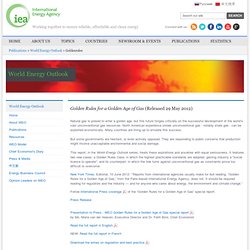
North American experience shows unconventional gas - notably shale gas - can be exploited economically. Many countries are lining up to emulate this success. But some governments are hesitant, or even actively opposed. They are responding to public concerns that production might involve unacceptable environmental and social damage. This report, in the World Energy Outlook series, treats these aspirations and anxieties with equal seriousness.
New York Times, Editorial, 10 June 2012: “‘Reports from international agencies usually make for dull reading. Follow International Press coverage of the “Golden Rules for a Golden Age of Gas” special report. Press Release Presentation to Press - WEO Golden Rules for a Golden Age of Gas special report by Ms. Read the full report in English NEW: Read the full report in French.
EurActiv.de - Portal: EU-Informationen, EU-Nachrichten, EU-Debatten mit News, Hintergrund und Politikpositionen - Europa und Europe, EU-Kommission, EU-Parlament, EU-Rat und EU-S. Die beiden Erdgaspipeline-Rivalen South Stream und Nabucco umwerben die Türkei.
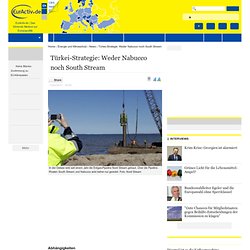
Die aufstrebende Regionalmacht kann allerdings kein Interesse haben, sich festzulegen, meint der Energieexperte Roland Götz. Die Rolle der EU-Kommission im Pipeline-Poker wertet er als sehr problematisch. Der beschleunigte Atomausstieg in Deutschland könnte zu steigendem Bedarf an Erdgasimporten in Deutschland und der EU führen, sagte der Energieexperte Roland Götz gestern vor Auslandsjournalisten in Berlin.
Trotz steigender Energieeffizienz, neuer Transportformen (Flüssigerdgas LNG) oder zusätzlicher Energiequellen (Schiefergas) werde die EU in 20 Jahren mehr Erdgas importieren müssen als heute, prognostiziert Götz. Abhängigkeiten Russland und die EU sind dabei durch gegenseitige Abhängigkeiten besonders eng miteinander verbunden. Umgehungsstraßen Russland will seine Rolle auf dem europäischen Energiemarkt ausbauen, zugleich seine Abhängigkeit von Transitländern wie die Ukraine oder Weißrussland abbauen.
Mka. EurActiv.de - Portal: EU-Informationen, EU-Nachrichten, EU-Debatten mit News, Hintergrund und Politikpositionen - Europa und Europe, EU-Kommission, EU-Parlament, EU-R. EurActiv.de - Portal: EU-Informationen, EU-Nachrichten, EU-Debatten mit News, Hintergrund und Politikpositionen - Europa und Europe, EU-Kommission, EU-Parlament, EU. In Deep Water: Can we afford to spill any oil?
Re2-_Sourcing_the_Nabucco_Pipeline_to_Prevail_Against_South_Stream.pdf (application/pdf-Objekt) Russia in the European energy sector. The Russian Federation supplies a significant volume of fossil fuels and is the largest exporter of oil and natural gas to the European Union.
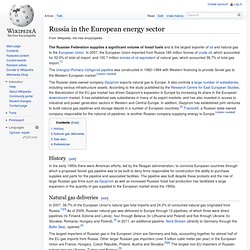
In 2007, the European Union imported from Russia 185 million tonnes of crude oil, which accounted for 32.6% of total oil import, and 100.7 million tonnes of oil equivalent of natural gas, which accounted 38.7% of total gas import.[1] The Urengoy–Pomary–Uzhgorod pipeline was constructed in 1982–1984 with Western financing to provide Soviet gas to the Western European market. [citation needed] History[edit] In the early 1980s there were American efforts, led by the Reagan administration, to convince European countries through which a proposed Soviet gas pipeline was to be built to deny firms responsible for construction the ability to purchase supplies and parts for the pipeline and associated facilities. Energy in Russia. Energy in Russia describes energy and electricity production, consumption and export from Russia.
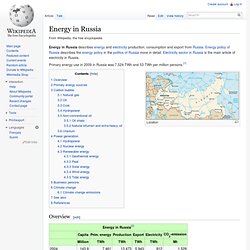
Energy policy of Russia describes the energy policy in the politics of Russia more in detail. Electricity sector in Russia is the main article of electricity in Russia. Trans-Anatolian gas pipeline. The Trans-Anatolian gas pipeline (TANAP) is a proposed natural gas pipeline from Azerbaijan through Turkey to Europe.
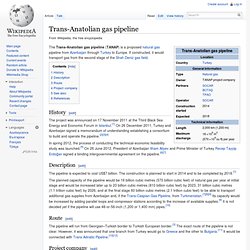
If constructed, it would transport gas from the second stage of the Shah Deniz gas field. History[edit] The project was announced on 17 November 2011 at the Third Black Sea Energy and Economic Forum in Istanbul.[1] On 26 December 2011, Turkey and Azerbaijan signed a memorandum of understanding establishing a consortium to build and operate the pipeline.[2][3][4] In spring 2012, the process of conducting the technical-economic feasibility study was launched.[5] On 26 June 2012, President of Azerbaijan Ilham Aliyev and Prime Minister of Turkey Recep Tayyip Erdoğan signed a binding intergovernmental agreement on the pipeline.[6][7] Description[edit] The pipeline is expected to cost US$7 billion. Route[edit] The pipeline will run from Georgian–Turkish border to Turkish European border.[3] The exact route of the pipeline is not clear.
Interconnector Turkey–Greece–Italy pipeline. The Interconnector Turkey–Greece–Italy (ITGI) is a natural gas transportation project proposed in the framework of the Southern Gas Corridor.
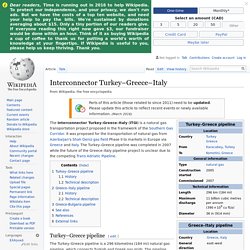
It was proposed for the transportation of natural gas from Azerbaijan's Shah Deniz gas field Phase II to markets in Europe via Greece and Italy. The Turkey–Greece pipeline was completed in 2007 while the future of the Greece–Italy pipeline project is unclear due to the competing Trans Adriatic Pipeline. Turkey–Greece pipeline[edit] The Turkey–Greece pipeline is a 296 kilometres (184 mi) natural gas pipeline, which connects Turkish and Greek gas grids. The pipeline begins in Karacabey in Turkey and runs to Komotini in Greece. History[edit] The agreement between Turkish gas company BOTAŞ and Greek gas company DEPA was signed on 28 March 2002.
Technical description[edit] The length of Turkish section is 210 kilometres (130 mi), of which 17 kilometres (11 mi) are under the Marmara Sea.